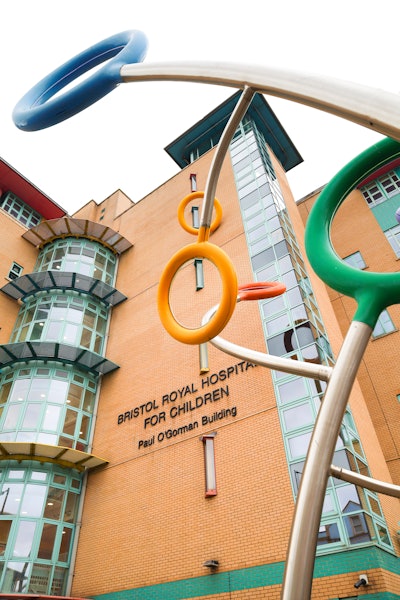A U.K. medical tribunal that ended on 4 June has issued a 12-month suspension to an AI researcher from Google Health who admitted to inappropriately messaging a 13-year-old patient while he was a medical student at Bristol Royal Hospital for Children.
The Medical Practitioners Tribunal Service (MPTS) heard that on or around 10 March 2011, Dr. Cían Hughes observed a procedure on the teenage girl, referred to as Patient A. After her discharge in April 2011, he sent messages to the patient over the next two-and-a-half years. Hughes admitted the messages were not part of Patient A’s medical care. He also admitted he sent them directly to Patient A and to no one else, and the messages became personal and more frequent.
 Dr. Cían Hughes was a 23-year-old medical student at Bristol Royal Hospital for Children when he first saw Patient A.
Dr. Cían Hughes was a 23-year-old medical student at Bristol Royal Hospital for Children when he first saw Patient A.
Additionally, Hughes admitted he sent Patient A messages from 23 October 2014 to 2015 with the intention of pursuing a sexual relationship with her. He said he kissed her in October 2014, engaged in sexual activity with her on 15 February 2015, and engaged in sexual intercourse with her on 29 May 2015, when she was 17 years old. He also said he knew Patient A was vulnerable.
Patient A was not called to give evidence at the tribunal, but the MPTS received a witness statement from her dated 14 December 2022. Hughes provided a witness statement dated 17 December 2024 and gave oral evidence at the hearing. The tribunal also studied documents from both parties, including “thousands and thousands” of iMessages and emails between Patient A and Hughes, dated between 2011 and 2018.
In a reflective statement, Hughes noted: “I was more open to the possibility of a relationship at that time given my personal circumstances -- being young and newly qualified in a new city, (having) an ill friend, (facing) professional pressure from training and exams, being single and alone over the Christmas period following the loss of my grandmother.
“This is a significant contrast to my position today, married, living near extended family and friends, and with an established job. These current circumstances, along with my overall maturity as a person today, further increase my confidence that I am not at risk of this scenario ever happening again,” he stated.
The MPTS found that Hughes’ reflections “showed learning from both his own experience and from the CPD (continuous professional development) he has participated in ... Dr. Hughes has shown significant insight into his misconduct, that he has learnt from that situation and would be able to prevent the initial boundary violation in the future.”
Other mitigating factors included his admissions at the outset of the hearing, his sincere apologies to those involved in his misconduct, a range of testimonials from colleagues stating he is a competent doctor and his contributions are highly valued, the lack of any other complaints about him, the lapse of time since the incidents took place and his increased maturity, and his cooperation with investigations by both the police and the General Medical Council after a complaint was first received in 2020. There was no suggestion that Hughes coerced or pressured Patient A into a relationship or any sexual activity within that relationship.
On the flip side, the MPTS said Hughes' actions had damaged public confidence in the medical profession. Among the aggravating factors were Patient A’s age at the time, in particular that she was 17 when the romantic and sexual relationship began; the power imbalance in the relationship due to Hughes’ professional position and the age difference; and “Dr. Hughes’ approach to the guidelines: that he was aware of the risk that the relationship was in breach of the guidelines but then looked for reassurance that the relationship was permissible, rather than the contrary view before progressing the relationship.”
The tribunal concluded that the facts of this case were finely balanced and “there were a number of serious factors within the misconduct which could denote that erasure would be the appropriate sanction,” but the mitigating features were important, particularly Hughes’ admissions and apology, and his remediation and remorse. Overall, it found “this was a factually nuanced case that could be distinguished from other cases of sexual misconduct where erasure was required.”
Research role at Google
According to his LinkedIn profile, Hughes has worked as a full-time research scientist at Google Health since 2019. He is based in Ireland and specializes in translational biomedical research. He was an honorary clinical fellow at University College London Hospitals NHS Foundation Trust in 2020, and he worked as an applied AI researcher at DeepMind from 2015 to 2019. He obtained a master’s degree in healthcare informatics at University College Dublin in 2014.
It is unclear what action, if any, Google Health plans to take as a result of the tribunal outcome. Early on 9 June, AuntMinnieEurope sent an enquiry with a set of questions to the company’s press office, but no reply has so far been received.
Bristol responds
In an article about the tribunal posted by BBC News on 9 June, a University of Bristol spokesperson said all medical students “undergo comprehensive ethical training, are subject to enhanced Disclosure and Barring Service (DBS) checks and are taught the importance of following fitness to practice guidelines from their first day.”
Guidance was “reinforced throughout” their studies and students are “specifically instructed not to share personal information with patients, including mobile numbers, email addresses, or social media accounts.”
The University Hospitals Bristol National Health Service (NHS) Foundation Trust, which manages the children’s hospital, said patient safety was of “top priority” and “inappropriate behaviour” would not be tolerated, the BBC reported. “We are proud to support the education of future NHS colleagues and are confident in the work of our academic partners to prepare their students for the high level of responsibility and privilege of training in a hospital.”
You can download the full MPTS documentation for the tribunal here.




















